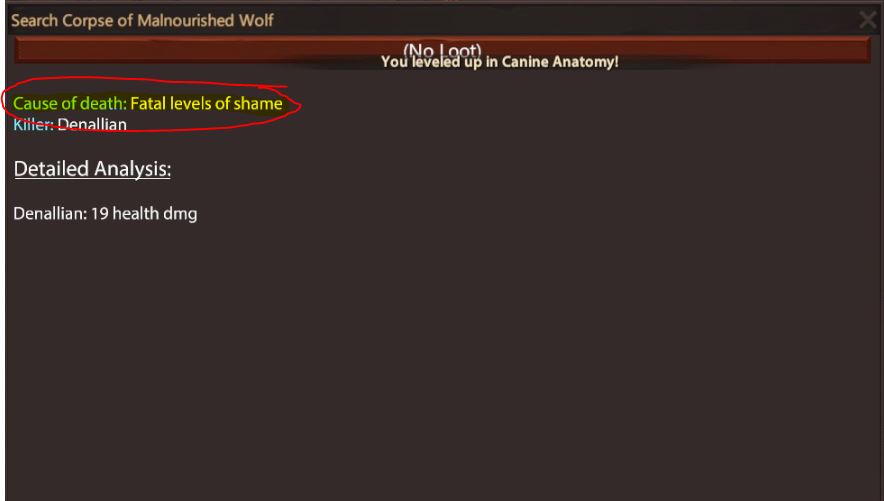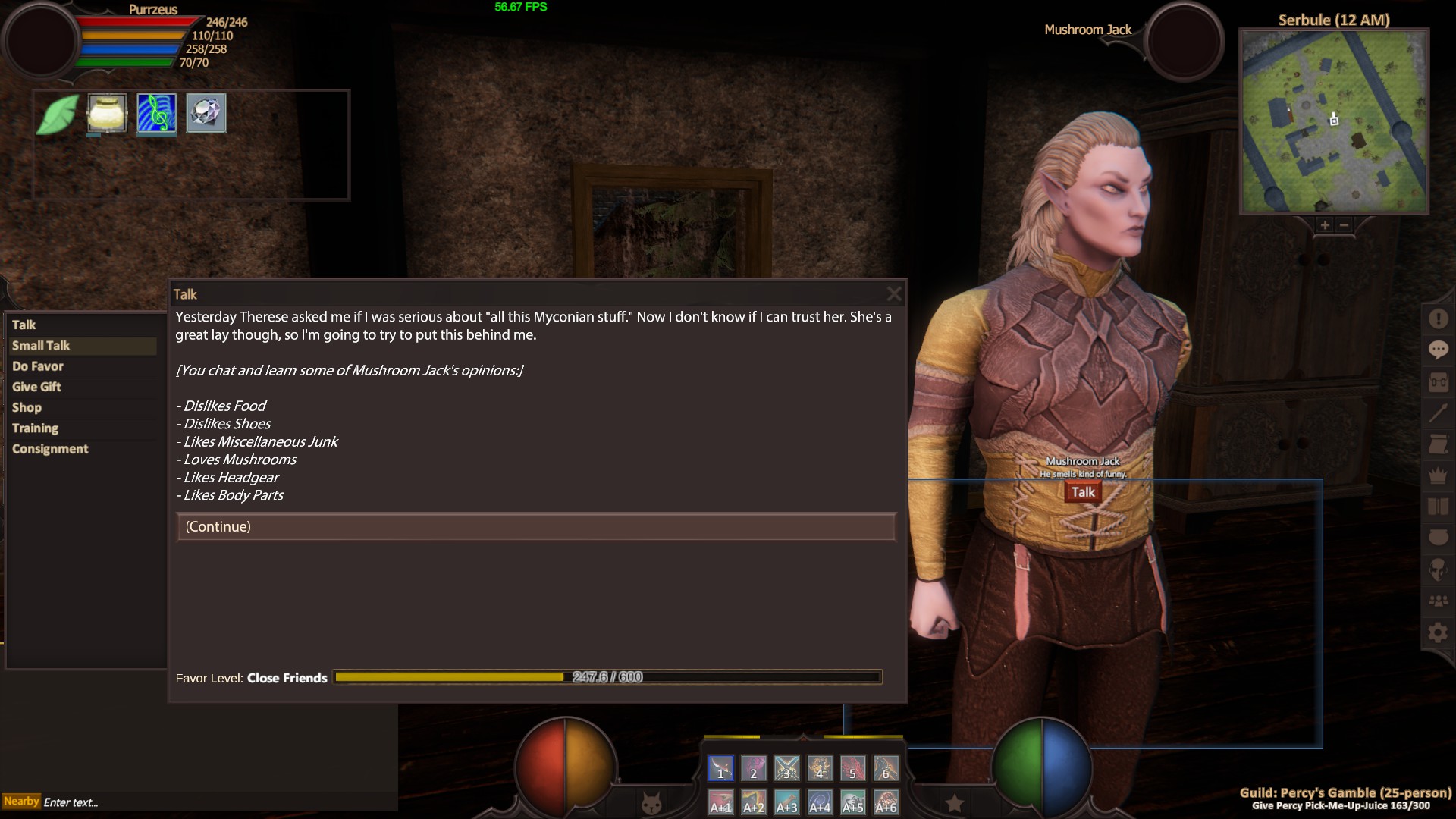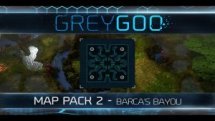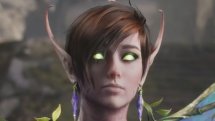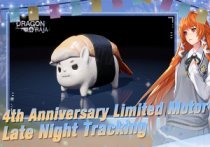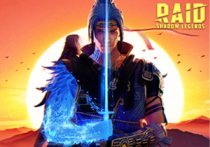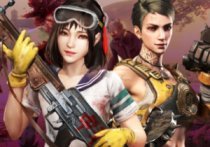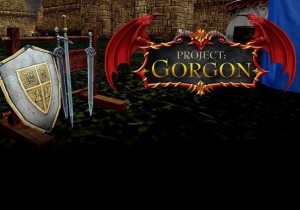Project Gorgon: Early Access Preview
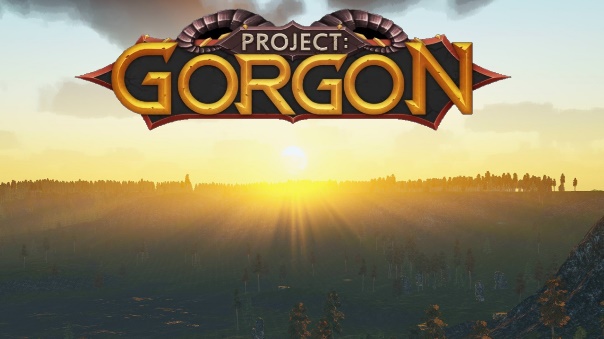
If you hang in any Discord channels I’m in, or Twitch streams, or any other social media, you will at some point or another hear me refer to games that have “All flash, and no bang”. As far as I’m concerned this refers to probably 80% of “AAA” titles these days. These games have beautiful visuals and stunning graphics, but otherwise lack any real substance. Trite stories, tired mechanics, and just generally no long term desirability to play, can all lead to the feeling that you got mugged by a game developer in a dark game store back room.
Then along comes a game where you do a double take and rub your eyes. No way, the graphics on this game couldn’t be THIS bad, could they? I mean, these take me back to Asheron’s Call, or Everquest. Maybe as late as DAoC if I really squint my eyes. It’s impossible this game is worth the 40 dollar Steam price tag. Isn’t it?
If the game you’re talking about is Project: Gorgon, then no, it’s absolutely worth the sticker price.
Created by husband and wife team Sandra Powers and Eric Heimburg, publishing as Elder Game, LLC, Project: Gorgon could very well end up being a sleeper hit. PG, as it is referred to by fans on its quite active unofficial Discord, The Gorgon’s Head, might look a bit dated at first glance – well, okay probably the second and third glances too. Despite this, the game play will hook you in and keep you coming back for more if you give it a chance. Between the gameplay features, the racy humor (elves have two ‘things’, and this is discussed by two NPCs in the starting town of Serbule), the story, and the wealth of things to do in the game, you’ll be busy for a long time to come.
Project: Gorgon is in Early Access, and while it has a few things to work through, the developers acknowledge them and continue to move forward. The game just has so many unique features, that I’m breaking this preview down into 3 segments: The good, the bad, and the meh.
The Good
Project Gorgon has one of the most expansive skill systems I’ve ever seen. Characters do not select an initial class upon creation, but instead start in the tutorial zone, Anagoge Island, with the Sword and the Unarmed Combat fighting skills. You can obtain two more combat skills before leaving the island. The rest of the skills, such as Shield, Staff (as used in melee), Fire Magic, and even Battle Chemistry, are learned through interaction with NPCs, or occasionally by finding a special item. All told there are currently 17 combat skills, from Animal Handling to Mentalism. Two more combat skills, Axe and Weather Witching, are still in the works.
In addition to these combat skills, there are also 7 animal forms that players can take: cow, deer, giant bat, pig, rabbit, spider, and lycanthropy. Each of these animal forms behaves like its own combat skill with its own strengths and weaknesses. With the exception of lycanthropy, however, a player cannot change in and out of these forms at will. Discovering how they are obtained is half the fun, so I won’t spoil that for you.
At any given time a player is allowed to activate two of these skills (a beast skill being one of the active skills if the player is in beast form). There are some restrictions on this as most weapons do not have an off-hand form. For instance, while you can use Sword and Archery (bows are held in the off hand) you cannot use Sword and Fire Magic, or Archery and Shield. Animals, of course, don’t have hands to wield most weapons, which rather limits what their secondary skill choices are.
That’s the general breakdown of how your main skills work. You also have a wide variety of secondary skills, nearly all of which have a benefit to other skills in the form of synergies. For example, high levels of Cooking can improve your Knife Fighting skill, as well as your ability to butcher corpses. Bards require Vocabulary, Poetry Appreciation, and even Flower Arrangement skills in order to pursue portions of their vocation, and the Phrenology skill offers benefits such as increased critical hit chance to Mentalism and Psychology attacks. The way the skills interact with and complement each other is so vast that it’ll blow your mind. Don’t worry, though; if it does you’ll get Dying experience, and someone can come along and perform an autopsy to find out how you died – and raise their Anatomy skill in the process.
There’s no limit to how many skills you can have, and all skills level up through usage. There are no character levels in the game. Instead, you have the skill level of your primary and secondary attack skills, and the equipment associated with those skills, that determines your effective level. This is really an informal statistic that people use in the game to determine ability to enter certain areas, such as dungeons or higher level zones. There are currently 70 levels in Project: Gorgon, with plans to increase this number to 120 by release.
The gear that your character is able to equip is based on their levels of active skills, and the gear system in Project Gorgon is fairly unique. Weapons don’t have an associated DPS value automatically assigned to them. All gear instead has what players refer to as “mods”: modifiers to skills. You might find a helm, for example, that modifies one sword skill and one unarmed skill, and has a requirement of Unarmed 5 and Sword 10. What mods an item has is random, and the higher the rarity of an item, as denoted by color, the more mods it might have. Thus, the end game goal is to have yellow/gold colored “Legendary” items with skill mods that most benefit your character’s build. The vast majority of items come from loot drops from enemy mobiles – especially bosses – or from chests found in dungeons. Occasionally, you might receive an item from one of the game’s many entertaining NPCs.
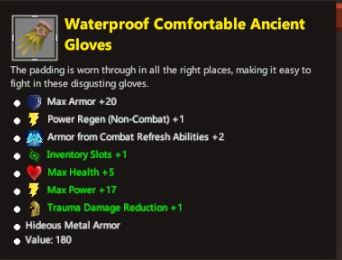
Whether discussing the invasion of sentient mushrooms with Serbule’s Mushroom Jack, helping an innkeeper find the lost pages of his deceased wife’s favorite book, or spending a little “quality time” with Rappanel the minstrel, interactions with the NPCs in Project: Gorgon are typically a delight. Admittedly, not all NPCs are your biggest fan when you first meet them, but with a little coercion and bribery, you can make even the saltiest of orc expatriates think of you as their soulmate.
Each NPC has a Favor level. Think of this roughly as an individual faction rating. There are three ways to raise Favor; doing favors, hanging out, and giving gifts. Really, I wish they’d change the term from Favor to something else, as it feels redundant and confusing with the ‘Doing Favors’ option.
Favors are also your primary source of quests in the game, and really just tend to be fetch quests with a few smatterings of “kill X thing” type jobs. The rewards can be far more variable: skill experience points (any skill, from gardening to weapon/active skills, depending on the favor done) or item rewards such as food or gear. Many favors can be done quite quickly, while others might be obtainable far before you have the means to acquire their resolution without a painful visit to the Markets (more on those later).
Hanging out with NPCs is a really interesting, and often hilarious, mechanic. It’s actually something that you do while you’re offline and can potentially cause EVE-like obsessive timer setting. You talk to the NPC then click on the hangout, and while you’re logged out of that character (even if logged into another character) the timer progresses. When you next log in after the timer has elapsed, you’ll find a popup screen explaining your rewards, often with some very entertaining flavor text. Similar to doing favors, the rewards for hanging out can be a combination of experience points, items, councils or an increase in favor with the NPC.
The final main way to increase favor levels with NPCs is by bringing them gifts. When engaging any given NPC, there is a list of interaction options on the left hand side of the window. One of these is “Small Talk”. By way of schmoozing and confabulating you seemingly plumb the depths of the NPC’s deepest desires, to discover whether they have a preference for seeds or flowers, lumber or metal slabs, or perhaps even just random junk.
The Bad
There aren’t a ton of things I would just say are out-and-out BAD on Project: Gorgon, but there are a couple that I want to mention, with the caveat that the game is still in development with plenty of time to fix these issues.
My first major peeve is with pet classes. The pet artificial intelligence really leaves something to be desired. The command used to order your Animal Handling pet to engage enemies, “Sic ‘Em,” often results only in the pet taking a few steps towards the target, and then stopping. This wouldn’t be a massive issue, except for the fact that the ability has a pretty lengthy cooldown, at 12 seconds. Not the end of the world perhaps, but incredibly frustrating when it happens for the 30th time in the same dungeon.
The necromancer, on the other hand, doesn’t even HAVE a command to order your pets to attack. You can only give them stances; Assist, Guard, Follow, Stay (Animal Handling pets also have these 4 commands). Their AI is equally bad, and they tend to ‘side pull’ extra mobs in dungeons. Furthermore, their health and damage don’t seem to scale very well as you level, and there are parts of the game where they will die in 1-2 hits from enemies, even in level-appropriate zones. To make this matter worse, you can only raise the majority of your skeletal pets when standing within a graveyard. When I was leveling as a Necromancer, I simply stopped trying to use the pet skills, and focused instead on the AOE and crowd control abilities.
This leads into my next complaint, which is that while there are a variety of weapon skills, there are only a few builds that most people consider ‘viable’ towards the endgame. Or perhaps my complaint is that group dynamics don’t seem to really exist. Instead of needing a tank, healer, damage dealers, and support (either buffers, debuffers, or crowd control), the strategy for content seems to be “everyone stack all their mods on one or two attack abilities to do the most damage possible and kill things really really fast”. While I can’t argue that this seems to be an effective stratagem, I really just don’t find it fun. It bothered me in Guild Wars 2, and it bothers me here. It also restricts the usefulness of some skills, which might not be as focused on damage output as others. It does seem that Citan (Eric) has intentions of addressing this issue, though, and there was even a recent nerf to AOE abilities, due to them seemingly being used in late-game dungeons to overwhelmingly devastate everything without any real challenge.
The thing that makes it hardest to for me to want to play on a daily basis is storage woes. I think this tends to be something that affects newer players much more than veterans for a few reasons, but essentially, you simply don’t have room for all of the stuff you’re going to need later. This wouldn’t be such a huge issue, except the only way for new players to get rid of extraneous items is to sell it to a vendor, or drop it on the ground. Now, selling items to a vendor doesn’t sound so bad, until you watch Global channel and see someone saying, “Ha, some idiot newbie just sold 3 stomachs,” an item that doesn’t drop frequently and is used in high level cheesemaking, “to a vendor for 5 councils! I paid 900 each for them last night!” There’s really no way to tell the actual value of items, which leads to a sort of hoarding mindset. I’m ever afraid of finding out that I pulled a move out of the C.M.O.T. Dibbler playbook, and missed out on a decent number of Councils, which are something that most players will never have enough of.
Why are Councils, the game’s currency, so hard to obtain? Well, the number one reason is currency doesn’t drop from enemies. You can receive coin purses with a small amount of councils in them, but these are uncommon drops at best in select locations, and not a reliable source of income. Furthermore, each vendor has a limited amount of cash with which to buy your loot each week. This amount can be increased by raising their Favor levels, but that requires gathering up items with which to give them. This in turn often requires storing items until you visit the appropriate NPCs to gift the item to, and also means that you’re not selling those items.
Most NPCs are also limited in how much they will pay you for any particular item. Once again, this can be increased via Favor (you may be coming to see how important Favor levels are with NPCs), and some NPCs don’t have limits on how much they will pay per item, but do have much smaller pools of money with which to purchase your goods.
NPC shopkeepers also will only buy a select list of items. Joeh in Serbule, for example, will only buy weapons and armor. Fainor, an innkeeper, will buy raw and cooked foods, and I believe cooking recipes. Sometimes finding an appropriate vendor to sell to can be a time-consuming journey.
Given time, you can increase the amount of storage you have available. Most storage comes through… duh duh duh: raising Favor with NPCs. You can also have pockets sewn into leather and cloth clothes for additional inventory slots, but this can be an expensive endeavor, and not one that new players can typically afford, leading us right back to the initial issue. Now, this is all part of the game, and some people might find it fun, but I do not. It’s not an insurmountable issue most days, but sometimes I just can’t be bothered to mess with it all, and start looking at other games in my Steam library.
The Meh
I’m going to start this section off with the Market. The designers, for whatever reasons (and I’m sure there are plenty of good ones) wanted to avoid an economic system involving an Auction House. Instead, what currently exists are large rooms within Serbule Keep, each having a large number of market stalls. At the entrance to each room is a sign, stating what items should be sold in said rooms. Apparently they’re merely polite suggestions, because nobody adheres to what those signs say. Additionally, opening a market stall isn’t something you should anticipate being able to do for the first several weeks of play.
You have two options in order to open a stall: pay the full price in Councils (20,000) or raise your Industry skill. The latter is done by turning in work orders to an NPC north of Serbule Keep. The work orders are posted to a board, and involve supplying items, either found or crafted, to said NPC. Each work order nets you a set amount of Industry experience, as well as some Councils. This would make them a steady source of income, except each work order can only be completed once in a 30 day period (once again discouraging me from ever wanting to discard or sell anything.) As I understand it, each level of Industry reduces the cost of buying the Retail Management skill (which is what is needed to open a stall), until you reach the requisite 25 points, which allows you to purchase a stall for a mere 1,000 councils.
The only thing that keeps this out of the Bad section is the recent addition of Catalog Golems. These NPCs will help you locate which market stall or stalls carry a given item, though it won’t give a price. This means you’ll have to do a bit of legwork if you want to make sure you get a good price. Still, this recent addition is a major improvement of the quality of life, and I hope it leads to an improvement in the player economy.
I could also go into the player work orders board, but I’d just as soon go Tyler Durden on myself. It would be less painful than trying to use them. Not only are they poorly organized, but they allow more experienced players to run roughshod over newer players who don’t know the value of things.

The second thing I’d like to see some work on is community and Guilds. For the most part, the community on Project: Gorgon is great. People are generally helpful and friendly, especially in the Discord. Unfortunately Global chat can degenerate towards some pretty unsavory topics, but it seems that after a recent flare up of bad behaviors, the devs stepped in and responded to reports with extreme prejudice, and there have been noticeable improvements.
Guilds on the other hand can be a bit inaccessible. There is no real in game listing or support for finding guilds. I did manage to join a couple, on different characters, and the people in the guilds were nice enough, though one was very inactive. Trying to simply ask in Global chat to join a guild usually meets with little success, possibly due to the fact that guilds have restrictions on maximum members and that guild quests tend to require high level participation to complete. This isn’t a major issue, as finding groups for dungeons tends to be pretty easy, but there are times when doing things with a guild can really enhance the MMORPG experience.
Speaking of dungeons, the ones in Project: Gorgon are not instanced. Every player in the game can walk into Serbule Crypts at the same time, if they so desired. Sometimes it feels like they have. There are pros and cons to this system. On the one hand, it means finding groups is pretty easy. You go into the dungeon, walk around, see another group, and ask to join. On the other hand, those groups are often full, and if they are they will move about the dungeon killing the enemies faster than you can compete with. Sometimes it won’t even be a full group doing this, but a single high level player farming the dungeon for objects to sell for gold or a specific item for a crafting recipe. Sometimes during prime time, it can be difficult to find anything to kill in a dungeon at all, but this isn’t a frequent issue by any means.
Finally, character customization. Really, this isn’t the biggest deal, since you’re going to end up covered in armor, but for a lot of people it is important what their character looks like. As it stands, characters on project Gorgon really don’t have a lot of visual variety. The devs acknowledge this at the creation window, though, and proclaim they fully intend to expand options in the future, including increasing the selection of races from 3 to 6.
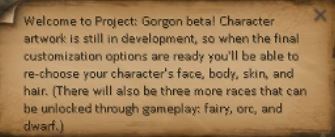
TL;DR
Project: Gorgon is an expansive and fun game with some forgivable faults. Even with the woes of inventory management, I find myself playing at least a few hours a day, though it has slowed down some from my initial intense fascination. The price point might feel high, but there are people who have been playing the game for years, starting during its free open alpha, who gladly bought the game when it went into beta on Steam. The majority of said players are really great folks who are intent on helping its husband and wife team put out a quality product. If you can see past the dated graphics, you’re sure to find PG to be a diamond in the rough. Just be forewarned, this is probably not a game you want your kids to play, and when the game finally hits release, current progress is going to be wiped for a fresh start.
Still very worth it.
Articles You May Enjoy
- Legendary Champions Shutting Down February 28
- Legendary Champions, the 3D fantasy MMORPG from Aeria Games, is shutting down on February 28, 2011.
- Skyforge PvP Press Event Preview
- The developers of Skyforge display a noticeable professionalism and acumen when it comes to their craft. They take the game quite seriously, a...


